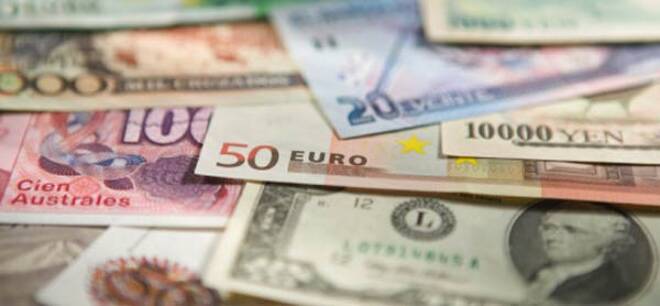Advertisement
Advertisement
EUR/USD Daily Technical Analysis for September 13, 2017
By:
European yields surged higher again as risk appetite strengthens and the global stock market recovery continued buoying the EUR/USD. Eurozone peripherals
European yields surged higher again as risk appetite strengthens and the global stock market recovery continued buoying the EUR/USD. Eurozone peripherals are outperforming as the ECB pledges caution while it prepares to take the foot off the accelerator. U.S. chain store sales dropped following Hurricane Harvey and Irma, which are expected to weigh on the national number this week. The German economic ministry expects growth to slow in the H2, saying the job growth could constrain sentiment.
Technicals
The EUR/USD generated a new doji day where the open and the close were at the same level which reflects indecision. Support on the currency pair is seen near the 10-day moving average at 1.1937. Resistance is seen near the September highs at 1.2092. Momentum is neutral as the MACD (moving average convergence divergence) histogram prints near the zero index level with a flat trajectory which reflects consolidation. The RSI (relative strength index) which is a momentum oscillator that measures accelerating and decelerating momentum, is printing a reading of 59, which is in the middle of the neutral range and reflects consolidation.
Chain Store Sales Drop
U.S. chain store sales fell 3.0% in the week ended September 9, after edging up 0.6% in the first week of September. The decline breaks a string of 3 straight weekly gains. However, the annual pace jumped to 2.3% year over year from 0.7% year over year. Sales climbed early in the week as consumer stocked up on supplies ahead of Hurricane Irma, but sales collapsed over the rest of the week, leaving the overall index in the red. The report also noted that overall retail demand across the country, as well as regionally in the South, was softer.
German Ministry Expects Growth to Slow
German economy ministry expects growth to slow in second half of the year, saying that while confidence in the economy remains strong, but job growth could slow down. Production expansion in the industrial and construction sectors could also be a somewhat slower, according to the ministry’s latest monthly report. Pretty much as expected and in line with recent indicators, although the uptick in the Ifo expectations index and the fact that confidence numbers remain at very high levels suggest that the recovery still remains very robust.
The ECB Executive Board member Coeure said in an opinion piece for Germany’s Boersenzeitung that Europe should seize the current recovery to have a “serious debate” about stronger integration and new institutions, warning that “we shouldn’t give way to the false concept, that the current economic recovery will heal every wound”. Nothing there on current policies, but more of an indirect call on Germany to soften its stance on Eurobonds and joint financing.
Trump White House Expected to Push for U.S. tax Reform
Aa push for bipartisan support will continue this week starting with a dinner at the White House Tuesday with moderate Democrats and Republican senators. Also, Treasury Secretary Mnuchin in a CNBC interview avoided being drawn in on the debate over economic advisor Cohn’s standing with the administration, noting that both are working hard on tax reform and will head over to the Hill together again this afternoon. Mnuchin also confirmed that Yellen was still be mulled to be reappointed, along with many other candidates. He acknowledged a temporary GDP hit from the hurricanes, followed by a snapback. Mnuchin still thinks tax reform legislation is likely before year-end, but doesn’t know if a 15% corporate tax rate is achievable.
UK Inflation Surged Higher
UK August inflation data came in perkier than expected, with the headline CPI figure spiking to 2.9% year over year, up from 2.6% year over year in July and matching the cycle high that was seen in May. The median forecast had been for a slightly softer 2.8% year over year reading. The core CPI figure lifted to 2.7% year over year from 2.4% in the month prior. Input prices came rose to a rate of 7.6% year over year, above the median forecast for 7.2% year over year and accelerating from July’s 6.2% year over year pace. Output prices rose 3.4% year over year, up from 3.2% in the previous month. Rising prices for clothes and motor fuels drove headline inflation higher.
About the Author
David Beckerauthor
David Becker focuses his attention on various consulting and portfolio management activities at Fortuity LLC, where he currently provides oversight for a multimillion-dollar portfolio consisting of commodities, debt, equities, real estate, and more.
Advertisement
